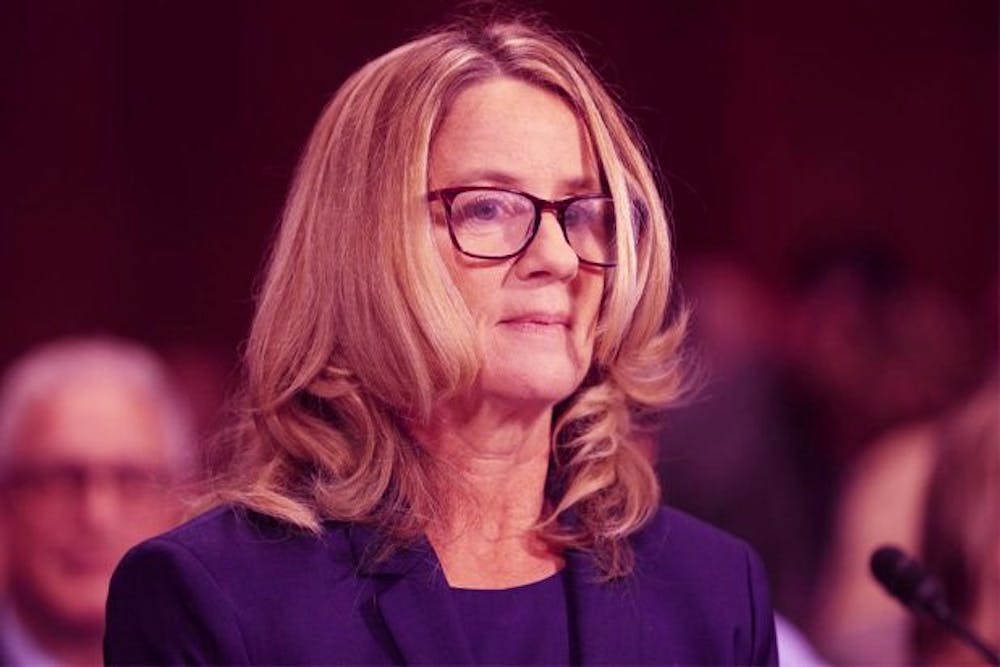
For two weeks, it felt like the entire country was consumed by the debate surrounding the Kavanaugh hearings. Kavanaugh and Ford served as proxies for the left and the right in an ideological and cultural battle that swept the nation. How far had the country progressed since Anita Hill, since third-wave feminism, since #MeToo?
Kavanaugh’s ensuing confirmation served as a cold answer. Despite the heart-wrenching weight of Ford’s ceremony testimony, all 11 members of the Senate Judiciary Committee’s majority party (who are also all male) had agreed to move the Kavanaugh nomination forward for a full Senate vote. And on Tuesday afternoon, over the sound of protesters chanting “shame, shame shame,” 50 senators (only 5 of whom were women) voted to confirm the nomination.
The ease with which this vast number of male Senators was able to denounce Ford’s emotional account, despite it being narrated directly to them, is indicative of a deeper issue when it comes to the way a vast number of men (especially men in power) confront sexual assault in the United States.
Kavanaugh’s nomination demonstrates a cognitive dissonance in the male Senators who voted to confirm. Instead of understanding that Ford’s experience is just one of many that women across the country deal with daily, these Senators saw the testimony as purely political, an attempt to diminish the potential of a conservative majority in Congress. Instead of seeing the women in their own lives in Ford, friends, daughters, wives, sisters, mothers, these Senators instead opted for the much easier emotional route of seeing Ford as a political adversary. The power of this cognitive dissonance is evident in Senator Jeff Flake’s change of heart after hearing the story of sexual assault survivors.
While Flake was on the way to push Kavanaugh's nomination to the Senate floor, Maria Gallagher and Ana Maria Archila caught the senator in an elevator. An activist from New York City, Archila used the encounter as a chance to tell Flake, “you have children in your family; think about them. I have two children. I cannot imagine that for the next 50 years, they will have to have someone in the Supreme Court who has been accused of violating a young girl.”
Gallagher added, “You’re telling me that my assault doesn’t matter … look at me and tell me that it doesn’t matter what happened to me.”
During the following Senate Judiciary Committee deliberations, Flake had a visibly troubled look on his face. Instead of delivering his expected affirming vote for Kavanaugh, Flake voted to push the Kavanaugh nominations forward only on the grounds that an FBI investigation take place for one week before Kavanaugh’s confirmation hearing among the full Senate.
Such a drastic change of heart in such a small amount of time was extremely unexpected for both the Senators and political pundits. Though Flake is one of the more moderate Senate Republicans and had debated on whether or not to push Kavanaugh’s nomination through longer than had his colleagues, his office nevertheless published a statement in strong support of Kavanaugh, alluding to the “presumption of innocence” and lack of “corroborating evidence.”
And though Flake would eventually vote to confirm Kavanaugh, it is clear that on the day of the Judiciary Committee vote, Maria Gallagher and Ana Maria Archila’s personal stories told to Flake outside a political setting broke the cognitive dissonance he and his colleagues held when it came to seeing Ford’s account as a political tactic instead of a survivor’s story. In an interview in the New York Times’ podcast “The Daily,” Ana Maria Archila said she wanted Flake to understand for the first time “the pain that women are feeling.” By doing so, she forced Flake to see the true emotional struggle that sexual assault victims must deal with, and the pain it would bring to so many if another victim were silenced.
But men turning to cognitive dissonance to escape confronting the emotional rawness of sexual assault is an issue that is not exclusive to Congress. Across the country when a sexual assault allegation arises, from Cosby to Kavanaugh, you’ll hear men across the country proudly denounce the assailant. Peggy Orenstein interviews teenage and college-age men on their experiences with intimacy for her book on emotional intimacy and sex. When she asked some of her subjects about the Kavanaugh hearings, many men were quick to announce that “neither they nor any of their friends would ever do such a thing.” Though it is important to condemn the actions of those that commit such egregious crimes, ascribing sexual assaulters to a deranged, minority faction of society instead of understanding the overarching conditions that caused the assault can lead many to fall into the same trap of cognitive dissonance as the senators on the judiciary committee.

Photo (with edits): Ninian Reed // CC BY 2.0
Instead of proudly condemning the acts of those like Kavanaugh and confiding in the idea that we would never commit such an act, men need to be willing to confront the emotional rawness of the rape culture in the U.S. and dig deeper to understand why these assaults happen, how we may be playing a part in perpetuating it, and how we can work to help end it.
Orenstein’s research goes on to detail many ways men can unknowingly perpetuate a culture of sexual violence: Parents who tell their sons to not get a girl pregnant ignore the much harder conversation of being sure your partner is consenting, or male friends who are praised for sleeping with and ghosting a girl encourage the treatment of women as objects to conquest.
It’s easy and important for men to condemn Kavanaugh and to realize that what he did was wrong. But, if there is going to be a change in this country when it comes to the way women are treated, men can no longer be satisfied with denouncing the actions of the accused. They need to go deeper, to have the uncomfortable conversations. Call out your friend who makes the sexist joke that you know is wrong. Expect more from your friends than the low “boys will be boys” standard set by Kavanaugh supporters. In doing so, maybe we can hope to be a small part in a much needed change for the women of this country.

SIREESH RAMESH is a College freshman from Alpharetta, Ga. His email address is sireeshr@sas.upenn.edu.
The Daily Pennsylvanian is an independent, student-run newspaper. Please consider making a donation to support the coverage that shapes the University. Your generosity ensures a future of strong journalism at Penn.
Donate







